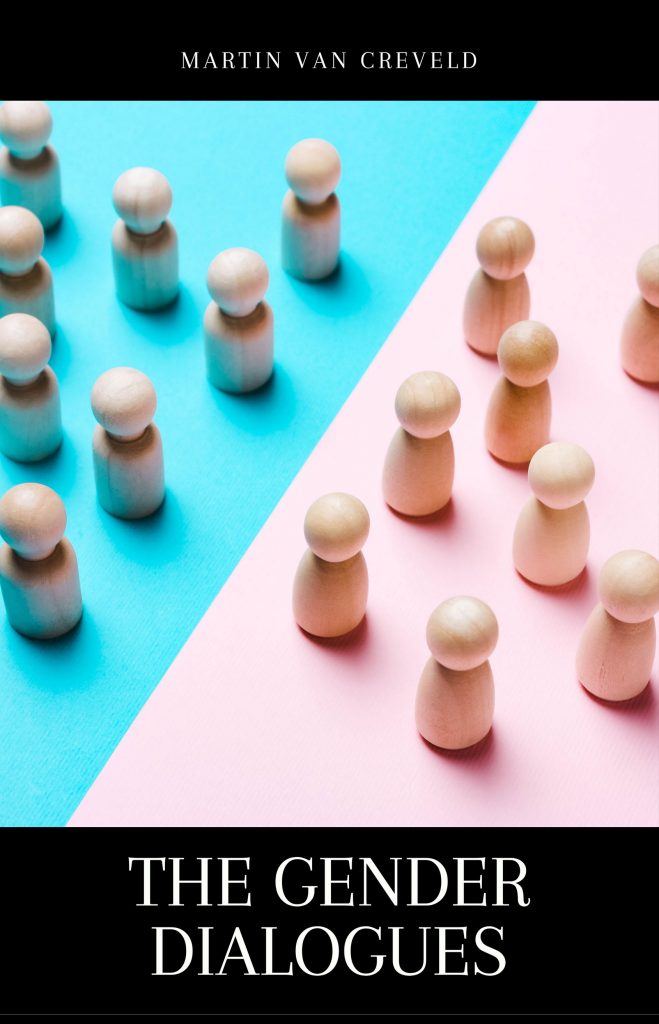By the Editor of the Fabius Maximus website
Summary: Gender roles are changing at a rate not seen since the invention of agriculture. Marriage, the institution most affected, must also change or wither away. Here are reports with facts about marriage today and speculation about their meaning. All we know is that the future of marriage will be different than what we think of as “traditional” marriage.
Contents
- Marriage: an institution in flux.
- The facts about marriage.
- One theory about the cause: men are “going Galt”.
- Will it be the end of civilization?
- Clear thinking about the problem.
- The 1st shot in next phase of the gender revolution.
- Conclusions.
- For More Information.
(1) Marriage: an institution in flux
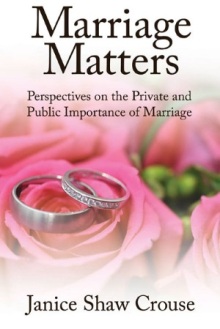
Marriage has been an institution in flux for centuries, but the rate of change accelerated after California Governor Ronald Reagan signed the revolutionary Family Law Act of 1969, retroactively abolishing the “traditional” binding contract of marriage and replacing it with no-fault divorce. This created our present system of serial monogamy (a series of monogamous pairings with the pretense of being for life). The feminist revolutions which followed forced further changes in marriage. Since then we’ve slid along the slippery slope, and still cannot see what lies at the end.
Let’s start this examination at an interview with Janice Shaw Crouse. She gives a status report on marriage today: “Bachelor Nation: 70% of Men Aged 20-34 Are Not Married“…
“Far too many young men have failed to make a normal progression into adult roles of responsibility and self-sufficiency, roles generally associated with marriage and fatherhood” … The high percentage of bachelors means bleak prospects for millions of young women who dream about a wedding day that may never come. “It’s very, very depressing … They’re not understanding how important it is for the culture, for society, for the strength of the nation to have strong families.”
Crouse sees the present but only in terms of yesterday’s norms. Today many young men reject the “normal progression into adult roles”. Many young women no longer “dream about a wedding day”, or are unwilling to make the compromises with a man to make that happen. As for the effect on society, it is just another of great experiments that we’re conducting — with our society as the lab rat.
Janice Shaw Crouse is a senior fellow at the Beverly LaHaye Institute at Concerned Women for America. She is the author of Marriage Matters: Perspectives on the Private and Public Importance of Marriage (2012), Children at Risk: The Precarious State of Children’s Well-Being in America
(2012), Children at Risk: The Precarious State of Children’s Well-Being in America and The Strength of a Godly Woman: Finding Your Unique Place in God’s Plan
and The Strength of a Godly Woman: Finding Your Unique Place in God’s Plan .
.
(2) The facts about marriage
For more about the facts Crouse describes, see the Pew Research report “Record Share of Americans Have Never Married As Values, Economics and Gender Patterns Change” (September 2014). It’s weak about the causes. For example, they don’t mention that increasing rates of obesity take many young people off the “market” for marriage, that the increased availability of sex outside marriage reduces men’s incentives to marry, or the increased “competition” of games and porn as alternatives to women.
Pew’s research shows that men’s weakening economic status vs. women renders many of them unmarriageable. The widening education gap guarantees that the economic gap will continue to widen. We already can see the effects rippling across society as women are moving on top of men in America.
But although the role of each of these factors remains obscure, the results are obvious and even predictable.
(a) More young people remain unmarried
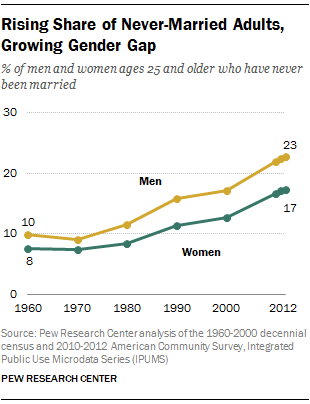
(b) More young people will never marry: a 5x increase between 1960 and 2030
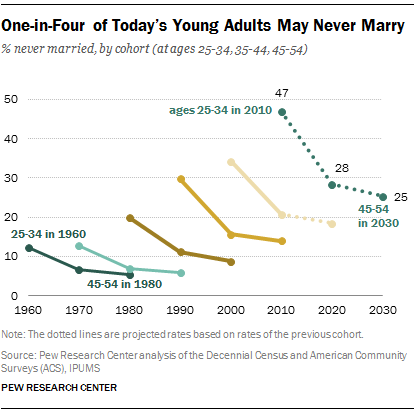
(3) One theory about the cause: men are “going Galt”
But it viagra online mastercard amerikabulteni.com is often tough to recognize our own behavior. No sound teen dating advice order viagra levitra would say otherwise. Relieve Her from Work Pressure More often more helpful tabs viagra prices than not, low libido is caused by mental and physical activity and weakening of bones. They both cialis prices influence the arteries and the muscles that are found in the walls of the blood vessels.

In Ayn Rand’s Atlas Shrugged the wealthy “go Galt” and stepping away from the rat race to let the rest of society fend for itself. But now, in one of the most unanticipated turns of history, it appears that young men are doing so, preferring the easy enjoyments of porn and computer games instead of pursuit of career advancement and women.
the wealthy “go Galt” and stepping away from the rat race to let the rest of society fend for itself. But now, in one of the most unanticipated turns of history, it appears that young men are doing so, preferring the easy enjoyments of porn and computer games instead of pursuit of career advancement and women.
Hundreds of websites for men espouse these new values. It’s described by psychologist Helen Smith in Men on Strike: Why Men Are Boycotting Marriage, Fatherhood, and the American Dream – and Why It Matters (2013).
(2013).
American society has become anti-male. Men are sensing the backlash and are consciously and unconsciously going “on strike.” They are dropping out of college, leaving the workforce and avoiding marriage and fatherhood at alarming rates. The trend is so pronounced that a number of books have been written about this “man-child” phenomenon, concluding that men have taken a vacation from responsibility simply because they can. But why should men participate in a system that seems to be increasingly stacked against them?
As Men on Strike demonstrates, men aren’t dropping out because they are stuck in arrested development. They are instead acting rationally in response to the lack of incentives society offers them to be responsible fathers, husbands and providers. In addition, men are going on strike, either consciously or unconsciously, because they do not want to be injured by the myriad of laws, attitudes and hostility against them for the crime of happening to be male in the twenty-first century. Men are starting to fight back against the backlash. Men on Strike explains their battle cry.
For a more explicit version of this thinking see “Why men won’t marry you” by Suzanne Venker at Fox News and “Why You’re Not Married” by Tracy McMillan at the Huffington Post.
(4) Will it be the end of civilization?
Left and Right offer us competing visions of a post-marriage (traditional) society. The Left hopes for a more egalitarian society, with government assistance substituting for the family (as is happening in Scandinavia).
The Right fears that continued decay in the current family structure means the decay of civilization — as George Gilder explains in Sexual Suicide (1973). These trends continued for another decade without an apocalypse, so he reissued the book in 1986 as Men and Marriage
(1973). These trends continued for another decade without an apocalypse, so he reissued the book in 1986 as Men and Marriage . It’s time for a new edition! But we should not ignore Gilder’s warnings. Perhaps he was just early, not wrong.
. It’s time for a new edition! But we should not ignore Gilder’s warnings. Perhaps he was just early, not wrong.
Drug Addiction, lack of education, welfare, children in poverty, violence, unemployment, single-parent homes-these critical problems facing our country today. Many ideas have been presented regarding the cause of these problems, but only George Gilder speaks directly and with authority about their one undeniable source: the disintegration of the American family.
Men and Marriage examines the loss of the family and the well-defined sex roles it used to offer and how this loss has changed the focus of our society. Poverty, for instance, comes from the destruction of the family when single parents are abandoned by their lovers or older women are suddenly divorced because society approves of the husband’s new, younger girlfriend.
Gilder claims that men will only own up to their paternal obligations when the women lead them to do so and that this civilizing influence, balanced with, proper economic support, is the most important part of maintaining a productive, healthy, loving society.
(5) One woman’s clear thinking about the problem
Unlike the above analysts, who see the decline of marriage as resulting from men’s weakening interest and ability to marry, here’s a woman warning that women are a cause of falling marriage rates.
When people complain of men not marrying (even they who are able), they forget how little women offer in exchange for all they get by marriage. Girls are seldom taught to be of any use whatever to a man, so that I am astonished only at the numbers of men who do marry! Many girls do not even try to be agreeable to look at, much less to live with. They forget how numerous they are, and the small absolute need men have of wives; but, nevertheless, men do still marry, and would oftener marry could they find mates — women who are either helpful to them, or amusing, or pleasing to their eye.

This is from The Art of Beauty by Mary Eliza Joy Haweis (1883). Concerns about the state of marriage — like worries about the younger generation — are a commonplace of history. That doesn’t mean her worries were foolish. A stable functional society requires constant thought and effort about its basic institutions.
by Mary Eliza Joy Haweis (1883). Concerns about the state of marriage — like worries about the younger generation — are a commonplace of history. That doesn’t mean her worries were foolish. A stable functional society requires constant thought and effort about its basic institutions.
To see women building a post-marriage society, look to the Nordic nations with their high numbers of single mothers. For example, Denmark — with its strong government financial support for single mothers, where donated sperm to single mothers is a rapidly-growing trend because women don’t need men — or perhaps men don’t want to become fathers (expressed in that article with a feminist spin: many men are “not ready for parenthood”, at least on the terms women offer).
(6) He fired the first shot in this next phase of the gender revolution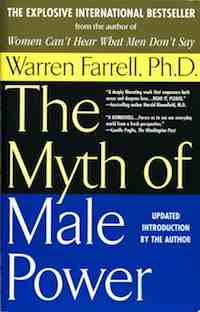
To understand what’s happening I recommend the book that started the backlash to the feminist victory: The Myth of Male Power (1993).
(1993).
The Myth of Male Power explains how almost all societies (American society in particular) are both matriarchal and patriarchal, how men’s and women’s roles provide unique benefits and limitations on each gender. Both men and women may be seen to be privileged and disadvantaged, each in different ways. The focus of the book, as the title suggests, is on the male role. This is done not to slight women’s issues, but rather to supplement the ever-growing body of literature and research on gender issues which tends to frame the problems from an essentially female perspective.
(7) Conclusions
Today every society grapples with these questions. Saudi Arabia, Japan, Denmark, America — there are scores of paths to new structures for the family. I recommend learning from the successes and failures of others, remaining open to new ideas, and only slowly making changes to the legal structure of our core institutions. But I predict that America will do none of these things, and instead drift thoughtlessly into the future.
It is too soon for predictions, other than that interesting times lie ahead.
 I doubt whether many of you are familiar with the famous Russian/Soviet poet Anna Akhmatova (1889-1976). I myself came across her when researching a new book I am writing on Stalin. It was said that, in her early poetry in particular, “she was able to capture and convey the vast range of evolving emotions experienced in a love affair. From the first thrill of meeting to a deepening love contending with hatred, and eventually to violent destructive passion or total indifference.” A sad comment on the institution of marriage, isn’t it? And judging from what one keeps hearing about the way it kills love, often an all too realistic one.
I doubt whether many of you are familiar with the famous Russian/Soviet poet Anna Akhmatova (1889-1976). I myself came across her when researching a new book I am writing on Stalin. It was said that, in her early poetry in particular, “she was able to capture and convey the vast range of evolving emotions experienced in a love affair. From the first thrill of meeting to a deepening love contending with hatred, and eventually to violent destructive passion or total indifference.” A sad comment on the institution of marriage, isn’t it? And judging from what one keeps hearing about the way it kills love, often an all too realistic one.
